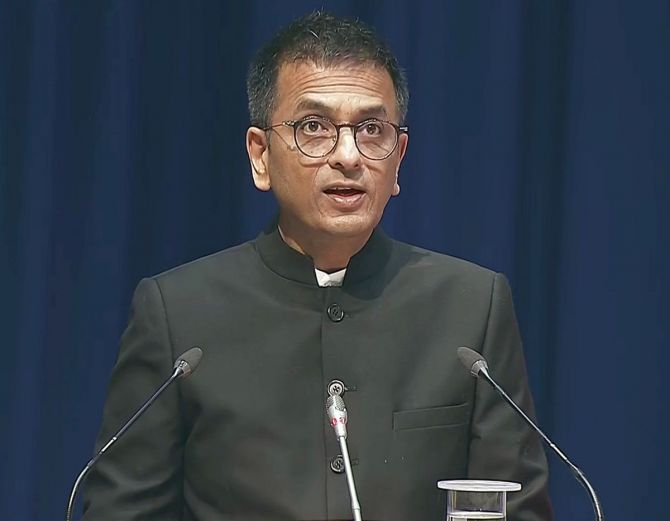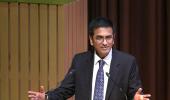The legislature and the executive "must enable" the practice of democratic ideals of liberty, equality and fraternity besides the courts sustaining these values by "foregrounding" them in their judicial decisions, Chief Justice of India D Y Chandrachud on Saturday.

In his speech at the end of the day-long Constitution Day function in the Supreme Court premises in Delhi, the CJI said, "The Constitution does not force its citizens to choose between their rights and their culture. Rather, it includes the cultural, social and religious aspects in its journey to the goal of a democratic society."
The people of India, in their interactions with one another, must breathe life into the Constitution by practicing the democratic ideals of liberty, equality, and fraternity, he said.
"The courts of the country must sustain this practice by foregrounding these same values in their judicial decisions, and the legislature and executive must enable the practice of liberty, equality, and fraternity," he said.
Listing out some of the achievements and future projects, Justice Chandarchud said there was no better way to celebrate the Constitution than by practicing its ideals every single day of our lives, the ideals of liberty, equality, and fraternity
"Through its programs, the Supreme Court has attempted to apply these ideals as well: it is in the process of extending the establishment of Vulnerable Witness Deposition Centres to courts across jurisdictions and enabling paperless courts," he said.
The top court recently inaugurated an online RTI portal to streamline processes of transparency, he said, adding that 'E-seva kendras' are being set up in every district so that every citizen may deploy technology to ease their journey through the legal system and the National Judicial Data Grid is a giant step towards making the legal profession more accessible.
"Soon, the Supreme Court will conduct an audit of its premises to review and ensure its accessibility to persons with disabilities. When I stand before you exactly one year from now, I hope that I can list out a new set of ventures that make justice more accessible to the common citizen," he said.
He referred to the discussions with the chief justices of various high courts as fruitful and said, "today's sessions on judicial infrastructure, judicial reforms, and court and case management will also prove useful in this mission."
Terming the Indian Constitution as "doubly unique", Justice Chandrachud said it was one of the few post-colonial Constitutions which was not written in Lancaster House, near Buckingham Palace in London and moreover, it not only "endured, but thrived and flourished" during the last decade.
He said unlike many countries, India's Constitution was forged by Indians here in New Delhi
"We forged it in the flames of ardent hope for a bright future. The first Constitutions of Zimbabwe, Kenya and Malaysia - to name a few - were written in Lancaster House, near Buckingham Palace in London. It is a matter of great pride that our Constitution was written here, in New Delhi," he said.
He said one might say that Indians did not write their Constitution as much as borrow it.
Referring to the provisions inspired by the constitutions of other countries, he said it is true that, for example, the Directive Principles of State Policy were inspired by Ireland's system or that the chapter on fundamental rights was prompted by the United States' Bill of Rights.
"But that does not detract from the fact that the Constitution of India is uniquely Indian. The framers of the Constitution carefully considered the suitability of various provisions before modifying and incorporating them such that they suited the Indian context and the Indian polity. In the manner of its practical functioning, too, our Constitution is uniquely Indian," he said.
The continuing success of the Constitution is a testament to the people's choice of the rule of law over brute force to achieve a social revolution, he said.
"India has no doubt developed a robust constitutional culture but this does not mean that there is nothing left to be achieved," he said
Like the law, the constitutional values too are practiced, he said, adding, "the practice of constitutional values is a continuous process which evolves as society evolves."
The CJI quoted B R Ambedkar and said, "These principles of liberty, equality and fraternity... form a union of trinity in the sense that to divorce one from the other is to defeat the very purpose of democracy."
Without equality, liberty would produce the supremacy of the few over the many. Equality without liberty would kill individual initiative, he said quoting Ambedkar.
"Without fraternity, liberty and equality could not become a natural course of things. It would require a constable to enforce them," the CJI said, quoting the architect of the Indian Constitution.










